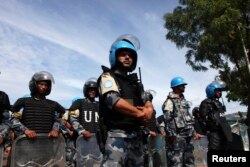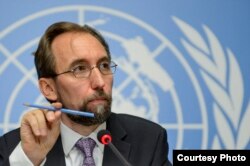The election of Donald Trump has left many U.N. diplomats nervous because of the candidate's isolationist talk on the campaign trail and his loud disregard for the United Nations.
After eight years with an extremely engaged multilateralist Obama administration, many diplomats fear the U.S. will return to the darker days of George W. Bush, who pursued his foreign policy outside the United Nations.
“We very much hope we can continue to count on the deep cooperation and the leadership of the United States within the United Nations system,” U.N. spokesman Stephane Dujarric said Thursday.
The United States also is the single largest financial donor to the U.N., contributing about $8 billion annually, and some worry it could significantly scale back its payments at a time when the organization is juggling responses to multiple humanitarian crises.
In March, at a speech to the American Israel Public Affairs Committee (AIPAC), Trump spoke of “the utter weakness and incompetence of the United Nations,” suggesting he had no love for the organization.
“The United Nations is not a friend of democracy, it's not a friend to freedom, it's not a friend even to the United States of America where, as you know, it has its home," the then-candidate said.
Art of the deal
The international community also is on edge waiting to see if Trump follows through on threats to renegotiate or cancel several major international agreements, including on Iran's nuclear program (Trump: "disastrous") — and the Paris Climate accord, which only went into force last Friday.
Trump has said the concept of global warming "was created by and for the Chinese" to hurt U.S. manufacturing. Diplomats say if he withdraws from the deal, it will send a negative message to other nations and hurt efforts to mitigate the effects of climate change.
U.N. Security Council members also have been considering for several months whether to try to push through a resolution before the end of the Obama administration setting out the parameters for a future peace deal between Israel and the Palestinians, or one declaring Jewish settlements on Palestinian lands illegal.
At the same AIPAC event in March, Trump said a parameters resolution would be “a catastrophe and a disaster for Israel,” adding, “When I'm president, believe me, I will veto any attempt by the U.N. to impose its will on the Jewish state. It will be vetoed 100 percent.”
On the campaign trail, Trump was hit with strong criticism from the U.N. human rights chief, Zeid Raad al-Hussein, for his stance on torture and harsh rhetoric.
“If Donald Trump is elected, on the basis of what he has said already and unless that changes, I think it's without any doubt that he would be dangerous from an international point of view,” the high commissioner said last month.
Uncertainty
Diplomats here privately say they share those concerns.
“Officially, I will say that my government looks forward to working with any U.S. government in power,” one diplomat said this week. “But privately, we are very concerned.”
That diplomat's sentiment has been echoed by many others in the U.N. corridors since Wednesday morning.
Iraq's ambassador welcomed the election result, but said of Trump's stance toward his country, “From what he has said, there is really not yet a clear policy.”
Others say they are not even sure who is in charge of foreign policy in the Trump transition.
Asked if U.N. Secretary-General Ban Ki-moon plans to meet with Trump, his spokesman said there currently are no plans, but he would be open to it.
“We also have to wait and see who our interlocutors will be — who the foreign policy people will be around the president-elect.”
Ban wraps up two terms as U.N. chief at the end of this year, just three weeks before Trump will be inaugurated.







